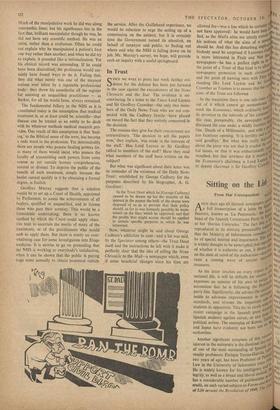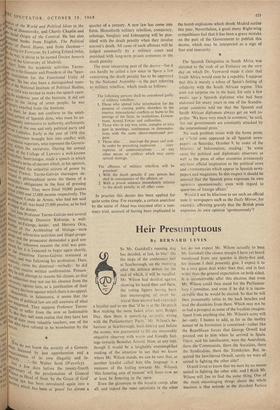Sitting on the Lid , :ocial From Our Correspondent n•or a
full transcription of a letter by ;i6futiri; anyth .FEw days ago all. Spanish newspapers ..jore arriln Ibarruri, known as `La Pasionaria,' the vi 10 other, head. of the Spanish Communist Party in 7i 01 know As the letter touches on every asPe-r f oh° , national life, it will be diflictilt for anYorl` di' an opinion of his own to escape accusation that he is following the Pos00t party line. Significantly, she advises the conie.rig inside to advocate improvements to uni:i° 1 standards, and stresses the important l'iti110 students in opposition. This fits in nicely w-ais0 recent campaign in the Spanish press Oro', of Spanish students against unrest, or any 1,r°„(10/ political action. The examples of Korea, and Japan have evidently not been lost °it authorities. ned Another significant symptom of this re*,,tal: interest in the university is the dismissal last 'or of one of the most outstanding of SPanish versity professors. Enrique Tierno-Galvan, f° politic two years of age, has been Professor ,06. La}kwisinwitdheel yUniversity oorf his tealairnnarlica sinced r gence ri a nn teguty, as well as a broad and liberal outl°°' bis RI a has a. considerable number of publications t°,,ifs credit, on such varied subjects as Forms Thy cto.tt, of Life around the Revolution of 1848, wo L. of the World and Political Ideas in the 11::s Dostoievsky, and Charlie Chaplin and Origin of the Comical. He has also -" books from English, The Political slated1131 of David Hume, and from German- bellbeing for Everyone, by Ludwig Erhard (who, bG way, is about to be named Doctor honoris Part ef the University of Madrid). ,i7 from his academic activities Tierno- ."14ill is the founder and President of the'Span- ttir Association for the Functional Unity of her°1"e: He has also been a distinguished mem- andj.f the National Institute of Political Studies, jpe 1,1:11954 was invited to make the speech open- '01" academic year of the Institute. It did not tyrnve to the liking of some people; he was PiPtly silo-, expelled from the Institute. lished rt, he does not conform to the estab- flue , Pattern of Spanish dons, who must be un- folkill"ablY submissive to authority, enthusiastic dev-wers of the one and only political party and nun(all Catholics. Early in the year of 1958 this his;Cenforrnism brought him into conflict with tocuteildeotic superiors, who represent the Govern- dir; "hin the university. • During the annual rnonaer, ,`"f the College of Lawyers a well-known uh-e"ist, Santnistegui, made a speech in which deu;"°ted a series of decrees which, in his opinion, ens3astrated the unlawful seizure of power by veker Franco. Tierno-Galvan thereupon de- triouPaedal to Philosophical terms the theme of a socia-irellY's obligations in the face of pressing .} (hboutroblems. They were fined 50,000 pesetas 114f oriu 300) and 25,000 pesetas respectively. The et alb*, te Conde de Arnau, who had not said dD arr „ hall was fined 25,000 pesetas, as he had ia.a"g_e. the dinner. others tine Professor Tierno-Galvan and severiall kno,sincluding Dionisio Ridruejo, a we. broliin ex-Falange, leader, and Herrera Oria, accuerd of the Archbishop of Malaga—were Banda °f subversive activities and illegal propa- teue and the prosecutor demanded a gaol sen- kneed. and
unknown reasons the trial was post-
111 but it is expected to begin again shortly. liberty meantime Tierno-Galvan remained at stitlde-Ynt alld was following his profession. Then, not came his dismissal—veitally : he did ably -I,'" receive written confirmation. Presum-. tallueiv4a"ethWerillti
may not use his absence from the
aesttempt to resume his classes, so that arbitersitdes ainst him, as a justification of their L,rarYision against which there is no appeal. stu.ideanWhile, in Salamanca, it seems that the has 1rikis of Political law are still unaware of what Qahli"PPetted. They suppose Professor Tierno- one !'1 to suffer from the now so fashionable out they will soon realise that they have lost fe ;their most valuable teachers, one of the system e have refused to be browbeaten by the tne1011 do not know the severity of a Govern- tut:. harassed by just apprehension and in- Just a security of its own illegality and Walter Scott (Waverley). k a few days before the twenty-fourth Prall 'ersarY of the proclamation of General rrit° as Head of State `by the Grace of God' nial law has been introduced again into a country rY Which has been at `peace' for almost a
quarter of a century. A new law has come into force. Henceforth military rebellion, conspiracy, sabotage, burglary and kidnapping will be pun- ished with the death penalty when they involve anyone's death. All cases of such offences will be judged summarily by a military court and punished with long-term prison sentences or the death penalty. The most interesting part of the decree—for it can hardly be called a law since in Spain a law concerning the death penalty has to be approved by the National Assembly—is the part referring to military rebellion, which reads as follows: The following persons shall be considered guilty of military rebellion: 1. Those who spread false information for the purpose of causing public disorders in the interior, international conflicts or harm to the prestige of the State, its institutions, Govern- ment, Armed Forces and authorities.
2. Those who in any way unite, conspire or take part in meetings, conferences or demonstra- tions with the same above-mentioned pur- pose.
3. Those who . . . interrupt the peace and pub- lic order by provoking explosions . . inter- ruptions of communications . . . or any other means or artifices which may cause seriout damage.
The offences of military rebellion will be punished : I. With the death penalty if any person has died in consequence of the offence, or 2. With a prison' sentence immediately inferior to the death penalty in all other cases.
In practice this decree has been applied for quite some time. For example, a certain anarchist by the name of Abad was executed after a sum- mary trial, accused of having been implicated in the bomb explosions which shook Madrid earlier this year. Nevertheless, a great many Right-wing sympathisers feel that it has been a grave mistake on the part of the Government to publish this decree, which may be interpreted as a sign of fear and insecurity.
The Spanish Delegation in South Africa was elevated to the rank of an Embassy on the very day on which Dr. Verwoerd made it clear that South Africa would soon be a republic. I suppose that this is merely a token of Spain's feeling of solidarity with the South African regime. This does not surprise me in the least, for only a few weeks ago a Spanish diplomat who had been stationed for many years in one of the Scandin- avian countries told me that the Spanish and South African diplomats always get on well to- gether. 'We have very much in common,' he said, 'for our governments are constantly attacked by the international press.'
No such problem exists with the home presS;
an note appeared in all Spanish news- papers on Saturday, October 9, by order of the Ministry of Information, reading: 'In some cases the political and diplomatic observers as well as the press of other countries erroneously attribute official inspiration to the political news and commentaries which appear in Spanish news- papers and magazines. In this respect it should be stressed that the Spanish press expresses its own opinions spontaneously, even with regard to questions of foreign affairs.'
Would it not be hilarious to see such an official note it newspapers such as the Daily Mirror, for example, affirming gravely that the British press expresses its own opinion `spontaneously'?















































 Previous page
Previous page